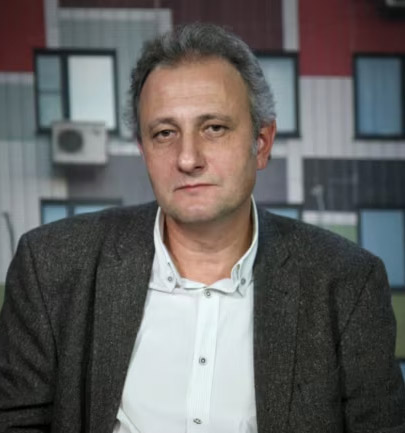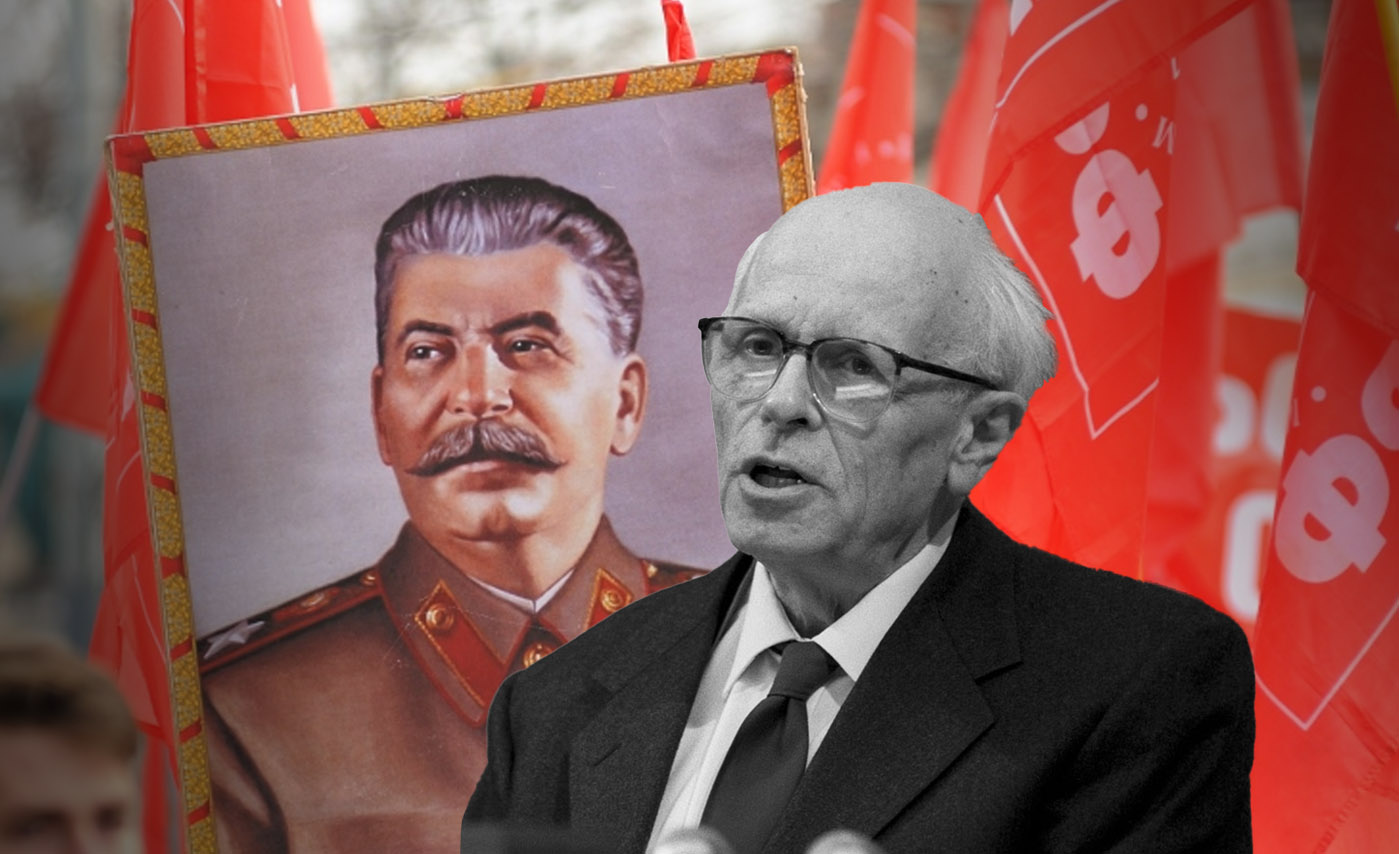 The regime marks its territory with words and deeds. Monuments to Stalin, Ivan the Terrible, and Zhdanov. Textbooks and assignments for the Unified State Exam and the Basic State Exam. Repressive legislation and endless prohibitions. Tightening — in its favor — the feudal right of preferential passage for cars with flashing lights. Tagging undesirable and foreign agents with yellow stars. Increasingly candid statements and the widespread use of hate speech, designed to ignite negative feelings towards those who do not march in step with the indifferent crowd. Unprecedented career, educational, and social preferences for those who are in the trenches or returning from them.
The regime marks its territory with words and deeds. Monuments to Stalin, Ivan the Terrible, and Zhdanov. Textbooks and assignments for the Unified State Exam and the Basic State Exam. Repressive legislation and endless prohibitions. Tightening — in its favor — the feudal right of preferential passage for cars with flashing lights. Tagging undesirable and foreign agents with yellow stars. Increasingly candid statements and the widespread use of hate speech, designed to ignite negative feelings towards those who do not march in step with the indifferent crowd. Unprecedented career, educational, and social preferences for those who are in the trenches or returning from them.
On the banner is an already no longer whimsical mixture of political orthodoxy with Stalinism. About Stalin as the banner of the regime, the speaker of the Duma Volodin spoke frankly at the closing of the spring session. A positive hero must always correspond to a negative one. And so the prosecutor's office declares two very small and not too noticeable organizations undesirable, but bearing the name of Andrey Sakharov. Two at once — to make the symbolic meaning of the decision clear: the organizations are vulnerable because of Sakharov's name, because this outstanding compatriot of ours is an enemy. An enemy in the past means an enemy in the present. "Peace. Progress. Human rights" — this is what the regime, having adopted militarism, archaism, and the psychology of the crowd, is fighting against.
Today's politicians easily manipulate gigantic and complex historical layers, generously handing out "plus" and "minus" signs to entire eras and political figures, compared to whom they are nothing. This is possible because we live in an era of monstrous simplifications — otherwise, it is impossible to explain to the masses why Russia must conduct military operations in the modern world, isolate itself from the world and culture, lock itself in its messianism, and its population is forced to endure a deterioration in quality and standard of living.
Here are Volodin's words about Stalin, or rather, just a small fragment of praise, as if the speaker were speaking not at a Duma session but at some XVII party congress:
"...And in this regard, the decision of our colleagues from the Communist Party faction to revise the decision of the XX Congress was very correct. Because in many ways it was the decision of the congress that laid the foundation for the attitude not only towards the leader of the state, who practically did everything for its creation, and as the supreme commander did everything for victory in the Great Patriotic War, but also this decision laid the foundation for the attitude towards us from our opponents..."
An act of national self-awareness, at least partial, but repentance, some kind of reflection, was canceled by one rhetorical intervention. The memory of the Soviet people, who stood firm in the terrible war not thanks to Stalin, but in spite of his barbaric policy (which the tyrant himself acknowledged in the famous toast to the Russian people), was insulted. The memory of millions of people who died in camps, millions of families who lived with the stigma of "members of the family of an enemy of the people" or "cosmopolitan," in constant fear and need, was defamed. The history of a militant, hostile empire towards its own people and simultaneously economically inefficient, whose unappetizing collapse continues today, was distorted.
Khrushchev and Gorbachev, from the point of view of amateur historian Volodin, "trampled" something there. These leaders were by no means sinless. But the thaw was a time of relative freedom, attempts to liberate people and culture, independent thinking. "People straightened up," they said then. Gorbachev freed the world from the fear of nuclear war, now Putin has returned this fear. Gorbachev created the prerequisites for the isolated empire to return to the world, Putin has turned Russia over the Atlantic finally. Gorbachev gave people the opportunity to think, speak, and act freely, now human and civil rights and freedoms are violated at every step. Unfreedom and hostility to the world are declared the basis of national identity and statehood. History is monopolized by autocracy, and therefore it is possible to incredibly distort historical facts from a high podium, and to present the complex as simple and black-and-white. What did these leaders "trample," who attempted to instill at least elements of humanism to the reinforced concrete pillar of centuries-old despotism?

In this black-and-white "us-them" matrix, one of the main symbols of true patriotism and, in Dostoevsky's words, "universal responsiveness" — Andrey Sakharov — was placed. It was important first to destroy the repository of memory about the great compatriot — the Sakharov Center, to expel it beyond the borders of the homeland. And now everything associated with Sakharov's name is marked with the hopeless word "undesirable."
A simple, black-and-white, clear picture: Stalin instead of Sakharov, Stalin against Sakharov. The bas-relief at "Taganskaya" against "Peace. Progress. Human Rights." Against "Progress, peaceful coexistence, and intellectual freedom".
In Sakharov's universe, as in the poem by Arseny Tarkovsky, it is the person who is "in the middle of the world." Rights and freedoms are what distinguish a person from "myriads of infusoria" or a fragment of a crowd controlled by a dictator. And what allows using scientific and technological progress not for killing people, but for their prosperity. But scientific and technological achievements do not develop in captivity: there will again be submarines instead of "people's" cars, guns instead of butter. Sakharov in his Nobel lecture:
"...It is especially important that only in an atmosphere of intellectual freedom is an effective education system and creative continuity of generations possible. On the contrary, intellectual unfreedom, the power of dull bureaucracy, conformism, first destroying the humanities, literature, and art, inevitably lead to a general intellectual decline, bureaucratization, and formalization of the entire education system, to the decline of scientific research, the disappearance of the atmosphere of creative search, to stagnation and decay...."
We have already entered this vicious circle. We are entering again, and it is unclear whether there is an exit from this maelstrom, into which the country is once again being drawn.
There is a way out. But authoritarian and totalitarian regimes will not agree with it, because repression lies at the core of such systems. Although Andrey Dmitrievich admonished them:
"...Striving to protect people's rights, we must, in my conviction, first of all, act as defenders of the innocent victims of regimes existing in different countries, without demanding the overthrow and total condemnation of these regimes. Reforms, not revolutions, are needed. A flexible, pluralistic, and tolerant society is needed, embodying the spirit of search, discussion, and free, non-dogmatic use of the achievements of all social systems. What is this — détente? Convergence? — the point is not in words, but in our determination to create a better, kinder society, a better world order..."
Every idea of the Nobel lecture "Peace. Progress. Human Rights," every paragraph of "Reflections on Progress, Peaceful Coexistence, and Intellectual Freedom," every word of the prophetic work "The World in Half a Century" contradicts what the Russian authorities are doing now and rises against what the Kremlin with Lubyanka imposes on society as state ideology and propaganda clichés.
Sakharov is a symbol of everything that today's political figures and ideologists have rejected. And it's not that Andrey Dmitrievich did not assume that such a regime could arise half a century after his main worldview works appeared. But it really seemed that his position, seemingly banal, but at the same time absolutely without alternative if humanity intends to survive, could be perceived by the "elites" of different countries as natural. In any case, the "end of history" confirmed the very possibility of a world without wars, practically without borders and violence against one's own and other peoples. The very world that responsible politicians aspired to after 1945. But... they relaxed. They compromised, did not see the danger in authoritarian tendencies, relied on the invisible hand of the market and the universal safety net of democratic procedures. But the insurance stopped working in a country that seemed to have taken the "high road" of humanity. How difficult it was to get on this road, and how, it turns out, easy it is to stray from the path and march back and somewhere sideways.
"Who is to blame?" "What to do?" — these eternal Russian questions are important, but there is no answer to another, quite legitimate in the current circumstances question: "Why?"
Why Stalin, Putin, Volodin, if we had Sakharov? Why do we need Yampolskaya with Medinsky, if we had Averintsev and Likhachev? Talk shows with Skabeeva and Solovyov, if there was "New World" by Tvardovsky, and then the perestroika thick journals?
"Doesn't give an answer," as the classic said. We will search. "To strive, to seek, to find, and not to yield," as another classic said.
* The Russian Ministry of Justice considers Andrey Kolesnikov a "foreign agent."
Photo: RGE / RL, A. Borodin, V. Musaelyan, and E. Pesov / TASS.